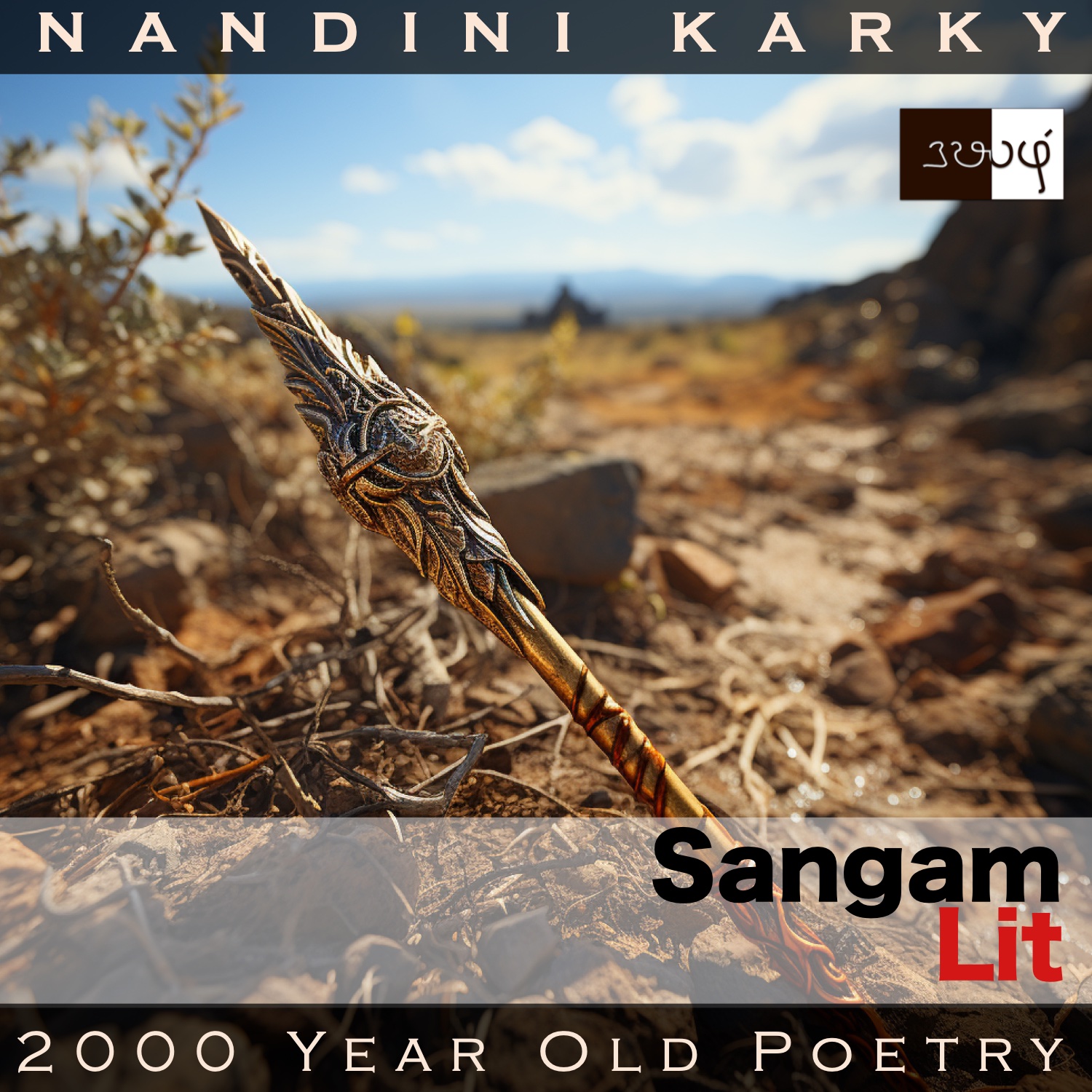Podcast: Play in new window | Download
Subscribe: Apple Podcasts | Spotify | Amazon Music | Android | iHeartRadio | Email | TuneIn | RSS | More
In this episode, we perceive the immense grief of a poet at the demise of a patron, as depicted in Sangam Literary work, Puranaanooru 235, penned about the Velir King Athiyamaan Nedumaan Anji by the poet Avvaiyaar. Set in the category of ‘Pothuviyal Thinai’ or ‘Common Themes’, the verse recollects with nostalgia the care and comfort felt by supplicants in the presence of this king.

சிறிய கள் பெறினே, எமக்கு ஈயும்; மன்னே!
பெரிய கள் பெறினே,
யாம் பாட, தான் மகிழ்ந்து உண்ணும்; மன்னே!
சிறு சோற்றானும் நனி பல கலத்தன்; மன்னே!
பெருஞ் சோற்றானும் நனி பல கலத்தன்; மன்னே!
என்பொடு தடி படு வழி எல்லாம் எமக்கு ஈயும்; மன்னே!
அம்பொடு வேல் நுழை வழி எல்லாம் தான் நிற்கும்; மன்னே!
நரந்தம் நாறும் தன் கையால்,
புலவு நாறும் என் தலை தைவரும்; மன்னே!
அருந் தலை இரும் பாணர் அகல் மண்டைத் துளை உரீஇ,
இரப்போர் கையுளும் போகி,
புரப்போர் புன்கண் பாவை சோர,
அம் சொல் நுண் தேர்ச்சிப் புலவர் நாவில்
சென்று வீழ்ந்தன்று, அவன்
அரு நிறத்து இயங்கிய வேலே!
ஆசு ஆகு எந்தை யாண்டு உளன்கொல்லோ?
இனி, பாடுநரும் இல்லை; பாடுநர்க்கு ஒன்று ஈகுநரும் இல்லை;
பனித் துறைப் பகன்றை நறைக் கொள் மாமலர்
சூடாது வைகியாங்கு, பிறர்க்கு ஒன்று
ஈயாது வீயும் உயிர் தவப் பலவே!
An elaborate and emotional song from this talented female poet from the Sangam times. The poet’s words can be translated as follows:
“If he had a little toddy, he would give it to us – That was then! If he had a lot of toddy, as we sang, he would eat along with us too – That was then! If he had but little food, he would share it in many plates – That was then! If he had a lot of food, he would share it in many plates – That was then! Whenever he finds meat bones with thick flesh, he would offer it to us – That was then! When it came to standing up tall with his arrows and spears in the battlefield, he would be there – That was then! With his fingers fragrant with the smell of orange flowers, he would caress my flesh-smelling tresses – That was then!
The spear that pounced on his chest pierced the begging bowls of talented bards, struck the hands of supplicants, hurt the eyes of those who love him, and finally fell on the tongues of poets, skilled in carving fine words!
The one who was like a protector, a father – where is he now? There will be no more poets; And no one to render unto poets; Akin to the huge flower of the grey rattle-pod that blooms on moist shores – a flower that no one prefers to wear, only useless lives that never render unto others seem to be many, many!”
Time to delve into the intricacies of this verse. All through the initial lines, the poet uses a repetitive word meaning ‘that was in the past’ and emphasises the helplessness felt at the thought that something precious is no more. And these precious things are illustrations of the king’s compassionate character. For instance, if there was only a small portion of toddy available, the king would readily give to people like the poet, without wanting any himself. Only if there was a lot, he too would partake in the same. After drink, the poet comes to food and says whether there was but little food or copious amounts of food, the king would always distribute it in many plates and share it with everyone who came to him. When the poet remembers with fondness a little habit of the king to offer the best pieces of meat – the ones where the flesh is attached to the bone – to others, we get a tangible sense of his gentle and thoughtful nature. As if saying it’s not all about food and drink, the poet declares if there was any fighting to be done, it was the king who would stand in front and face the enemy’s ire with spears and arrows. Returning again to the soft tone, the poet describes how the king would caress her flesh-smelling tresses with his hands, brimming with the smell of orange flowers, and records his display of affection from the heart. All these wondrous events are now in the past, the poet declares.
Presenting the symbolic trajectory of the fatal arrow that finished the king, the poet says it did not stop at the king’s chest, but went on to break the bowls of bards, wound the hands of supplicants, dim the eyes of the king’s beloved people, and finally fell, tearing the tongues of poets. She cries out in angst asking where their protector was, and declares in dejection that this was the end of poets and all those who rendered unto them. She concludes with the reason why saying that now who was left on earth were only people, who like the unworn rattle-pod flowers, were of no use to anyone for they never had the thought of giving unto others. A verse that etches the character of a king as the epitome of caring and sharing, and what the loss of this person means to a poet and a friend. To me, this sounds like a deep voice from the past enlightening us that the true legacy we leave behind is how we make people around us feel!




Share your thoughts...